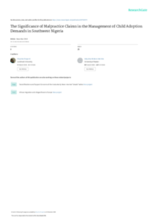Abstract: The wide gap between the demand for children and the available adoptable children in Nigeria meets with anecdotal claims on the existence of corrupt practices and systemic vulnerabilities within the child adoption domains. This study investigated the exactitude of these claims on the corridor of child adoption in Nigeria. Data were collected through sessions of qualitative interviews with adoption officials, legal practitioners, and intending/prospective adopters and orphanage managers. Findings revealed that the claims of corrupt practices within the system were not only significant but appear in various shades such as hoarding of adoptable children, request for extra-adoption charges, diversion of already identified children, and procedural circumventions. The corrupt practices and observed illegalities are enabled by some institutionalized adoption principles that prevail within the system of adoption. These observed illicit practices have tendencies to threaten the consideration of the best interest of the child which should be the paramount consideration in the placement of children who are to be adopted.

